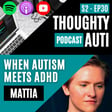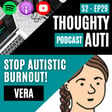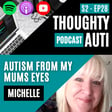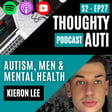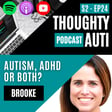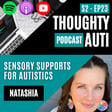
Low Support Needs Autism | The Unique Challenges
What is behind the 'profound Autism' backlash towards the ASD-1 adult community? What unique challenges face low support needs Autistic adults?
In this episode of the Thoughty Auti Podcast, Thomas Henley talks to @NeurodiverJENNt about low support needs autism, the unique challenges it presents, and the conflict between the autistic adult and parenting spheres.
Thomas’s Links: https://linktr.ee/thomashenleyUK
@NeurodiverJENNt - https://www.youtube.com/@NeurodiverJENNt
Chapters:
00:00 - 05:15 Introduction
05:15 - 15:36 Jenns Diagnosis Journey
15:36 - 32:30 Unique Challenges Of ASD-1
32:30 - 44:37 Autistic Masking
44:37 - 01:04:54 ASD-1 Adults VS Autism Parents
01:04:54 - 01:08:49 Jenns Takeaways
In this live podcast episode, Thomas Henley and NeurodiverJENNt discuss lower support needs autism. They talk about their experiences with caffeine and how it affects their ADHD. They also discuss looking younger than their age and the challenges it can bring. The conversation touches on topics such as live streaming, the pressure of being on camera, and the trial and error process of creating content on YouTube.
Thomas introduces the episode and explains why they chose to focus on lower support needs autism. They also mention a previous episode about autism and sleep with Dr. Megan Neff. In this part of the conversation, NeurodiverJENNt and Thomas Henley discuss the challenges of communication and social interaction for autistic individuals, particularly those with lower support needs. They talk about the difficulty of initiating and reciprocating social interaction, the energy and mental effort required to respond to messages, and the feeling of being stuck in the middle and not fitting in anywhere. They also touch on the impact of a late diagnosis and the process of self-discovery. The conversation then shifts to the topic of masking and its effects on well-being, self-perception, and social interactions.
In this final part of the conversation, Thomas and NeurodiverJENNt discuss the challenges of unmasking and the perception that unmasking is an act or performance. They also address the controversy between autistic adults and autism parent advocates, emphasizing the need for compassion and understanding between the two groups. They highlight the importance of listening to the experiences of lower support needs autistic adults and dispel the misconception that autism has a specific look or set of traits. They conclude by encouraging patience, kindness, and collaboration in advocating for the needs of all autistic individuals.
Song Of The Day (Listen Here) - https://open.spotify.com/playlist/5UDIyN5TSYN4zMcRoQPrG8?si=9255ed3480d840b5 Subscribe to the channel to get notified when I next go live 🙌
🗣️ My Socials and Podcast - https://linktr.ee/thomashenleyUK
🐰 My Favourite Energy Drink Powder (with L-Theanine) - https://affiliates.sneakenergy.com/s/thomashenleyuk
💻 My Amazon Store Recommendations (Sensory items, gym gear, YouTube set-up) - https://www.amazon.co.uk/shop/thomashenleyuk
🎧 Dbud Noise Cancelling Adjustable Ear Buds (20% Off with code: THOUGHTYAUTI) - https://dbud.io/bntvs5












